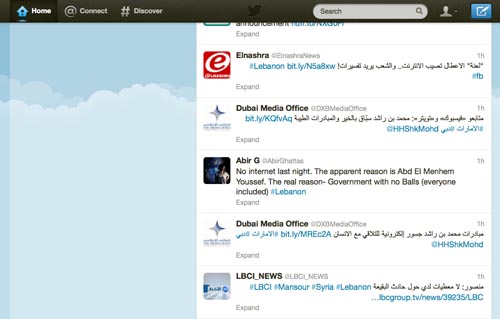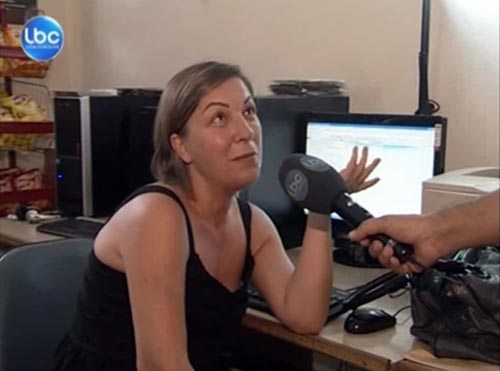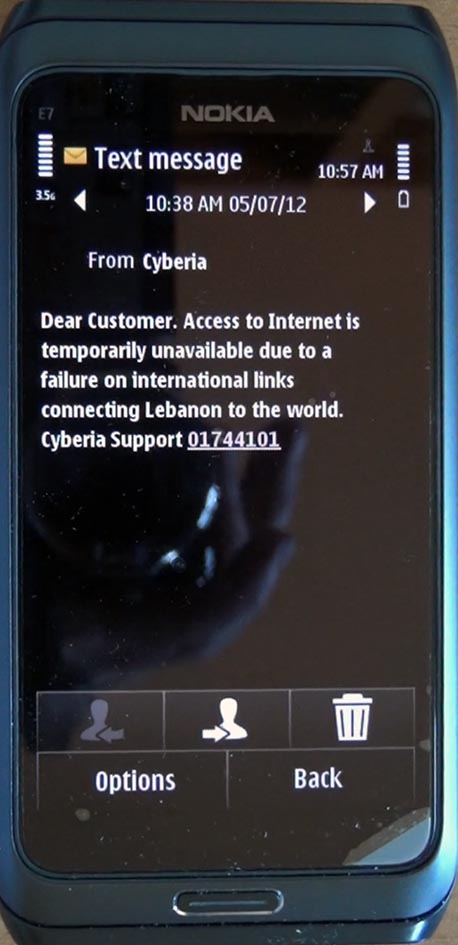
Livid, enraged, cut off, disrupted, discombobulated.
There aren't enough descriptions for what Lebanon's residents have felt in the last week -- three Internet blackouts in a country already noted for miserable connectivity.
"No internet last night. The apparent reason is Abdel Menhem Youssef. The real reason -- Government with no Balls (everyone included) #Lebanon," tweeted activist/photographer/business planner Abir Ghattas of the first shutdown blamed on a cut in a cable from Marseilles, France to Beirut.

Screenshot of Abir Ghattas tweet on first Internet blackout in a week.
She was referring to a tug-of-war pitting pro-and anti-government political factions against each other within the Ministry of Telecommunications and a company called Ogero tasked with running the state's landline phone system.
Ogero was supposed to be conducting a previously approved upgrade, according to news reports, but the man running it is tagged as a member of the "March 14" bloc that opposes the current government allied with Hezbollah and known as the "March 8" bloc.
Those dates are tied to the month following the assassination of former Lebanese prime minister Rafic Hariri on Valentine's Day in 2005, when pro- and anti-Syrian demonstrators took to Beirut's downtown area to promote their respective causes, and, after which Syria -- the main power broker in Lebanon -- withdrew its troops from Lebanon following a 30-year stay.
The current telecommunications minister, Nicolas Sehnaoui, is part of the March 8 coalition and is at odds with Ogero's executives.
The result of the three-hour July 2 blackout: Lebanon was disconnected from the world, sending everyone into a tizzy.
Irate Internet users hammered mobile phone carriers Alfa and Touch with 1,200,000 calls on Monday night to ask about the reason behind the Internet shutdown, but the companies could only respond to 35,000 customers, LBCI TV reported.

LBCI TV report on Internet cut in Lebanon (Abu-Fadil)
"All our work stopped, everything, no emails, we can't send any official documents," a woman interviewed by the channel said.
A young man said he couldn't live without the Internet and asked rhetorically, "Can you live without Facebook?"
LBCI reporter/producer Philippe Abou Zeid posted a Twitpic of famed cartoon character Road Runner asking his nemesis Wile E. Coyote whether he'd be able to catch the speedy bird's rear end before Lebanon gets its Internet service, to which the coyote replied: "I quit."
Lebanon suffers from one of the slowest Internet services in the world leading many potential business investors to look elsewhere because of the obvious disincentive, but being online has nonetheless become a vital part of Lebanese people's lives and work.
The country's shoddy connection prompted a group of activists to launch a campaign last year called Ontornet (Twitter handle @OntorNet), colloquial Lebanese Arabic for "wait for the net."
But they were suspiciously silent when disaster struck, and struck twice more in the span of a week.
"Dear Customer -- Access to Internet is temporarily unavailable due to a failure on international links connecting Lebanon to the world. Cyberia support 01-744101," was the text message I received from my ISP.

ISP Cyberia text message (Abu-Fadil)
That was Wednesday, and the blackout lasted for almost 48 hours, with painfully slow service being restored in dribs and drabs.
Minister Sehnaoui flew to the eastern Mediterranean island of Cyprus to help restore links to the world since that country is part of a maritime cable consortium that includes Egypt and France that feeds into Lebanon.
The second blackout was blamed on problems in Egypt.
"Due to an international cable failure, 50 km from Alexandria, Egypt, affecting 8 countries, Internet was down in Lebanon yesterday and will experience slowdown in the coming days. The Ministry of Telecom, in close coordination with Ogero teams, is working with Cyprus & Egypt to provide Lebanon with a temporary solution until the cable is repaired," was another text message sent to customers on Thursday.
It took the ministry over 24 hours to alert Internet users who were already fuming at the massive disruption.
The daily Annahar reported local customers wouldn't be compensated for their financial losses since Lebanon is one of nine owners of the IMEWE cable that supplies regional clients.
This prompted Mario Goraieb, an editor at the paper, to tweet a variation on the refrain used by demonstrators in Arab countries facing various types of revolts: "We want to topple the regime, because the Internet is tottering on the edge."

Screenshot of Mario Goraieb tweet
Ironically, Lebanon's national carrier Middle East Airlines was unaffected by the blackouts thanks to an alternate system that allowed it to remain online and in contact with travel agents in-country and abroad.
When the service was finally restored and Sehnaoui sent text messages to cell phone clients, Tinia Nassif of Annahar tweeted sarcastically: "Bakkir!" (it's early).
Then again on Monday June 9 service was disrupted and the Internet was cut briefly "apparently a malfunction in the backup cable," activist Ghattas tweeted.
To which this writer responded that the Lebanese may well have to revert to homing pigeons, unless some trigger-happy people shoot them down.
So it's almost funny reading the headline "Deadline expires for 'Doomsday' fix: What you need to know," when Internet blackouts and regular power cuts are a way of life in Lebanon.
True to form, Lebanese politicians passed the buck when the crises occurred, the news website Al Nashra reported.
